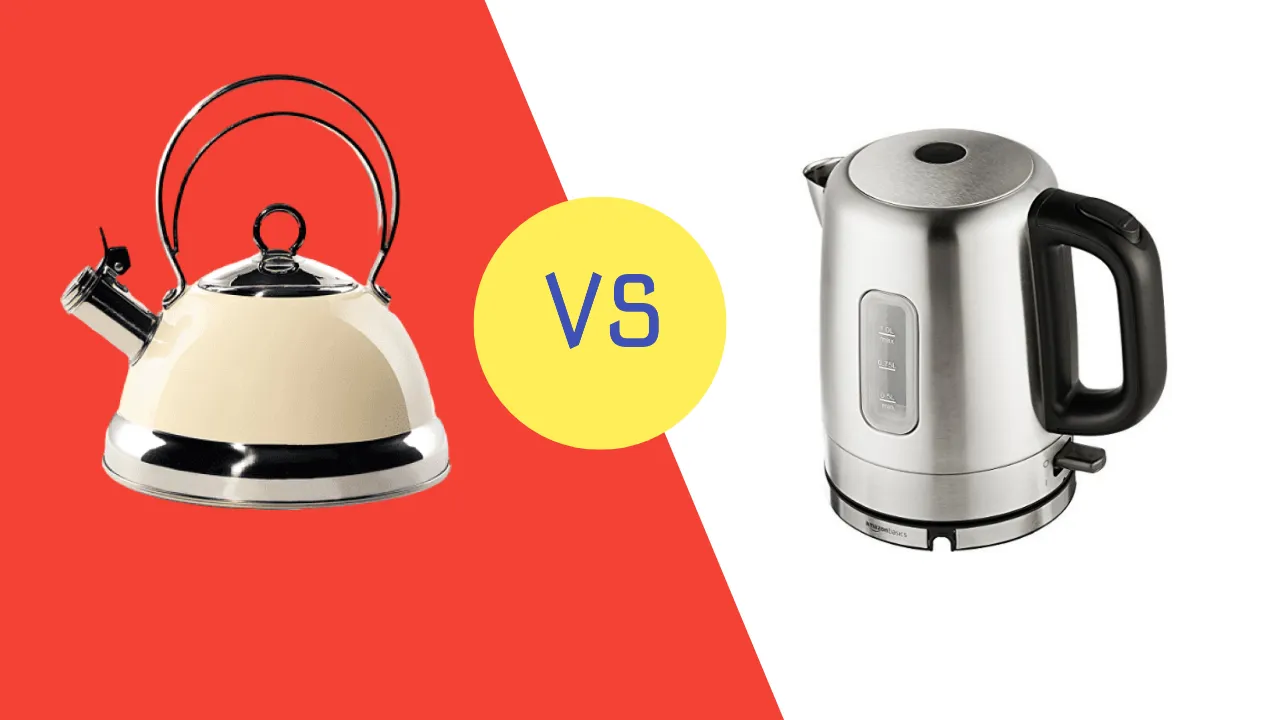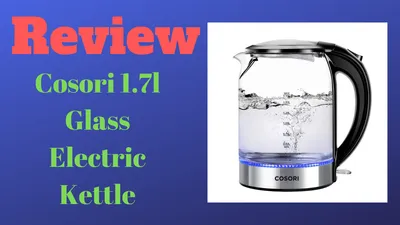Electric Kettle vs Induction Stove Kettle: A Comprehensive Comparison
Discover the key differences between electric kettles and induction stove kettles. Learn about their energy efficiency, versatility, and user convenience to make an informed choice for your kitchen.

Table of Contents
- Technology Behind Electric and Induction Heating
- Energy Consumption and Efficiency
- Range of Utility
- User Convenience
- Cost Analysis: Initial Investment and Long-term Use
- Environmental Impact
- Safety Features Comparison
- Aesthetic and Design Considerations
- Pros and Cons
- Best Induction Electric Kettles
- FAQs
- Conclusion
The quest for the perfect cup of tea or coffee often begins with choosing the right appliance to heat water. In modern kitchens, the debate between electric kettles and induction stove kettles has gained momentum as both technologies offer unique benefits.
Electric kettles have revolutionized our kitchens, offering speed and convenience. Induction stoves, on the other hand, provide versatility and precision in cooking. This comparison will delve into various aspects of both appliances to help you make an informed decision based on your lifestyle and preferences.
Technology Behind Electric and Induction Heating
Understanding the technology behind these appliances can provide insight into their performance:
Electric Kettles:
- Use a heating element (usually a coil) at the base
- Electric current passes through the element, generating heat
- Heat is transferred directly to the water
Induction Stoves:
- Use electromagnetic fields to generate heat
- Require ferromagnetic cookware
- Heat is generated within the pot itself, not the stovetop
This technological difference impacts efficiency, speed, and versatility of use.
Energy Consumption and Efficiency
Understanding the energy aspects of both appliances is crucial for making an environmentally and economically sound choice.
Efficiency Comparison
| Appliance | Energy Efficiency |
|---|---|
| Induction Kettle | 85-90% |
| Electric Kettle | 80-85% |
While induction kettles are slightly more efficient, other factors come into play:
- Power Consumption: Electric kettles typically have lower wattage ratings (1500-3000W) compared to induction stoves (1800-3700W).
- Carbon Footprint: Generally lower for electric kettles due to lower power consumption and focused heating.
- Heat Loss: Induction heating has minimal heat loss, while electric kettles may lose some heat through the body.
For more on electric kettle efficiency, see our article on are electric kettles energy efficient.
Range of Utility
The versatility of each appliance is a key consideration:
Electric Kettle Uses:
- Boiling water quickly
- Making tea and coffee
- Preparing instant noodles and soups
- Some models can cook rice and steam vegetables
- Cooking popcorn in specialized models
Induction Stove Uses:
- All electric kettle functions
- Deep frying and sautéing
- Cooking complex meals with precise temperature control
- Multiple pot cooking
- Compatible with various cooking methods (boiling, simmering, etc.)
Induction stoves offer more cooking options, but electric kettles excel in quick, simple tasks focused on water heating.
User Convenience
Convenience factors can significantly impact your choice:
| Factor | Electric Kettle | Induction Stove |
|---|---|---|
| Setup | Simple plug-and-use | Requires stove setup and compatible pot placement |
| Quick Tasks | More convenient | Less convenient for just boiling water |
| Complex Cooking | Limited | More versatile |
| Cleaning | Can be challenging due to internal elements | Generally easier, flat surface cleaning |
| Portability | Highly portable | Fixed appliance |
| Temperature Control | Available in some models | Precise control in most models |
For tips on kettle maintenance, check our guide on how to clean an electric kettle.
Cost Analysis: Initial Investment and Long-term Use
Understanding the financial implications of your choice is crucial:
Initial Cost:
- Electric Kettles: $20 - $100+ (high-end models)
- Induction Stoves: $50 - $500+ (varies widely based on features)
Operating Costs:
- Electric Kettles: Lower energy costs for simple water boiling tasks
- Induction Stoves: Higher initial energy use, but more efficient for various cooking tasks
Long-term Savings:
Electric kettles can lead to savings over time for households that primarily need hot water for beverages. Induction stoves may offer better value for those who cook frequently and need versatility.
Environmental Impact
Both appliances have environmental considerations:
- Energy Use: Electric kettles generally use less energy for simple tasks, while induction stoves are more efficient for varied cooking.
- Lifespan: Quality electric kettles and induction stoves can last several years with proper maintenance.
- Materials: Consider the recyclability of the appliance materials at end-of-life.
For eco-friendly options, consider ceramic electric kettles, which are often more durable and environmentally friendly.
Safety Features Comparison
Safety is a crucial factor in kitchen appliances:
Electric Kettles:
- Automatic shut-off when water boils
- Boil-dry protection
- Cool-touch exteriors in some models
- Cordless pouring with separate base
Induction Stoves:
- No open flames or hot coils
- Automatic shut-off when pot is removed
- Child lock features in many models
- Surface stays relatively cool
Both options offer safety features, but electric kettles are generally considered safer for quick water boiling tasks.
Aesthetic and Design Considerations
The look and feel of your appliance can be important:
-
Electric Kettles:
- Come in various designs and colors
- Can be a stylish addition to kitchen countertops
- More compact and easier to store
-
Induction Stoves:
- Sleek, modern appearance
- Blend seamlessly with kitchen countertops
- Require more permanent space in the kitchen
For stylish kettle options, check our guide on best vintage electric kettles.
Pros and Cons
Electric Kettle
Pros:
- Lower energy consumption for simple tasks
- Highly portable
- Fast boiling for small quantities
- Convenient for beverages
- Safe operation with automatic shut-off
Cons:
- Limited cooking variety
- Slightly less energy efficient than induction
- Cleaning can be difficult for some models
- Limited capacity compared to stovetop options
Induction Kettle
Pros:
- Wide range of cooking options
- More energy-efficient for varied cooking tasks
- Safe to use with cool-to-touch surface
- Easy to clean flat surface
- Precise temperature control
Cons:
- Higher power consumption for simple boiling tasks
- Less portable
- Requires compatible cookware
- Higher initial cost
Best Induction Electric Kettles
For those interested in combining the benefits of both, consider checking our article on the best induction electric kettles. These kettles offer the efficiency of induction heating with the convenience of an electric kettle.
FAQs
-
Q: Can I use a regular kettle on an induction stove? A: Only if it’s made of magnetic-based material. Most standard kettles aren’t compatible with induction stoves.
-
Q: Are electric kettles safer than induction stoves? A: Both are generally safe. Electric kettles have the advantage of being self-contained units, which can be safer for quick water boiling tasks.
-
Q: Which is better for boiling water quickly? A: Electric kettles typically boil water faster due to their dedicated design and focused heating element.
-
Q: Can I control the temperature on both devices? A: Many modern electric kettles and induction stoves offer temperature control. Check our guide on best variable temperature kettles for specific electric kettle options.
-
Q: How do the maintenance requirements compare? A: Electric kettles may require descaling, especially in hard water areas. Induction stoves generally need just surface cleaning. For kettle maintenance, see our guide on how to descale an electric kettle.
Conclusion
Choosing between an electric kettle and an induction stove kettle depends on your specific needs:
-
Choose an Electric Kettle if:
- You primarily need to boil water quickly for beverages
- Portability is important
- You have limited kitchen space
- Energy consumption for simple tasks is a primary concern
- You prefer a dedicated appliance for hot water
-
Choose an Induction Stove if:
- You need versatility in cooking
- You frequently cook complex meals
- Kitchen space isn’t a constraint
- You prefer more precise temperature control for various cooking tasks
- You want a multi-functional cooking surface
Both options have their merits, and the best choice depends on your lifestyle, cooking habits, and kitchen setup. Many households benefit from having both appliances, using each for its strengths.
For more insights on electric kettles and their uses, explore our other articles:
- What to Check When Buying an Electric Kettle
- Stovetop Kettle vs Electric Kettle: Which One is Better?
- Best Electric Kettles Made in the USA
Make an informed decision based on your needs and enjoy the convenience of modern kitchen technology!
Related Posts

How to Cook Maggi Noodles Using an Electric Kettle: A Quick and Easy Guide
Discover how to prepare delicious Maggi noodles using just an electric kettle. Learn about the best kettle features for cooking and get step-by-step instructions for a perfect bowl of instant noodles.

Cosori 1.7L Glass Electric Kettle: A Comprehensive Review
Discover the features, pros, and cons of the Cosori 1.7L Glass Electric Kettle. Learn about its design, performance, and how it compares to other models in this detailed review.

Stovetop Kettle vs Electric Kettle: A Comprehensive Comparison
Explore the pros and cons of stovetop and electric kettles. Learn about energy efficiency, speed, and design features to help you choose the best kettle for your needs.